A Simplified View of Fighting Game Narrative Evolution
By Hailinel 15 Comments
Depending on who you talk to, the best narratives in video games can be held against narratives of other media and be considered of legitimate quality, or they're all garbage and who really wants to play a video game for the story, anyway. The debate over the general quality of narratives in the medium as a whole aside, fighting games in particular have historically never been taken seriously for their ability to spin a yarn. This is a notion that even the most ardent defenders of game narratives have to concede, simply because for many years, stories in the genre were not considered a high priority. They were flavor to give these crazy menageries of ninjas, robots, dudes in karate gis and ladies of sizable assets some sort of context beyond being blank slates. Back in the early days of the genre, the most shocking plot twist in a fighting game was the fact that Chun-Li actually had a branching point in her Street Fighter II ending.
Early Successes (and Failures)
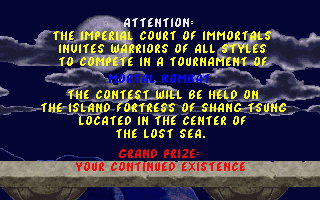
For many years, the fighting game series with the most comprehensive storylines were arguably Mortal Kombat and King of Fighters. In the case of King of Fighters, the yearly installments of the series featured stories that led from one game to the next, and over time have formed a series of simplistic sagas. However, the story in each individual King of Fighters game is largely the same; a tournament sponsored with nefarious intent is held, and a trio of determined fighters defeat the hilariously overpowered villain. Wash, rinse, repeat.
As for Mortal Kombat, the story is more complex, in that it eventually breaks away from the concept of each game being centered around a tournament. The problem with the series came in its later entries, when the story became so convoluted with characters and mind-numbing plot twists that Netherrealm declared a do-over by playing the reboot card. But more on that in a bit.
Prominent Problems
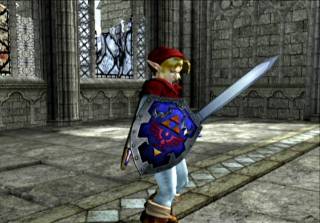
There are a lot of reasons that fighting game narratives have been, to put it kindly, less than stellar. Beyond the general disinterest on behalf of the writers to tell a decent story, there's the dysfunctional nature of the story progression. The majority of fighting games present an arcade mode that may, at best, present some form of prologue to introduce a character, perhaps one or two "story" fights, in which the fighter has a unique dialogue with his or her opponent, and an ending. But most of these endings will inevitably conflict with one another. For example, in Soul Calibur II, most every single ending involves the character finding the Soul Edge and either:
- Claiming it for him/herself, with varying results.
- Destroying it.
- Filling the world with darkness, because he's Nightmare and already had the Soul Edge to begin with.
In this case, there's no narrative continuity. Every ending leads down a different path, and likely only one ending, if any, will factor into the story for the next game. Characters that saw resolution in their endings will instead continue to seek their resolution. No room for closure is provided, if only because a character will likely come back for the sequel, and the writers can't think of any other motivation for him than the one he already had.
Okay, but what about stories that do link their endings together? Take Mortal Kombat: Deadly Alliance. When taken as a whole, the storyline of the game from its introduction to the individual character endings feels relatively cohesive. With a couple of exceptions, events in one ending are directly related to events in another. The individual parts manage to form a whole that feels coherent and logical. Only the endings of the villains (Shang Tsung and Quan Chi) really stand out from this because their endings dictate that they succeed.
So of course, the following game, Mortal Kombat: Deception, chooses to follow the ending path of the villains, thereby invalidating the tapestry created by Deadly Alliance. It was a self-inflicted shot in the foot. And while letting the bad guys "win" (their victory turned out to be exceedingly short-lived) might have been edgy and expected by Mortal Kombat standards, it could also be argued that this single twist broke the plot. The following game, Mortal Kombat: Armageddon, elevated the story even further into the realm of the absurd by reducing the narrative into a race between every single character in the series to reach the top of a ziggurat and fight a dude made of fire for Real Ultimate Power.
Huh. Well, then. Who's for a DC Comics crossover? Anybody?
...Guys?
Modern Solutions
But all is not lost. Modern fighting games have shown that it's possible to structure a coherent narrative with a solid beginning, middle, and end. And while the individual quality of the stories of these games is variable, they're all a far cry above the old standard of a simplistic ending presented as an award for reaching the top of the tournament ladder.
BlazBlue
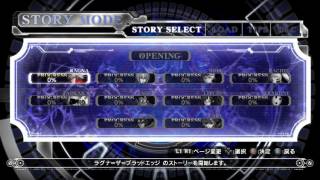
The BlazBlue series, created by Arc System Works, evolved from story presentation concepts found in their earlier work on the Guilty Gear series. And while multiple versions of the second game, Continuum Shift, have been released, the storyline has not been heavily affected as a result. The story is divided into smaller narratives that focus on individual characters, and each story has multiple paths; the ending earned is based on choices made in dialogue trees in actions taken during combat. However, each character's story path has one canon ending, and as progress is made through these individual stories, the player will eventually unlock the gameplay path to the true ending, which ties the narrative up and leads into the following game.
While it's not a straight path from beginning to end, the manner of narrative progression in BlazBlue offers incentives and replay value, as well as having the chance to practice with a range of diverse characters and styles. In a sense, these alternate endings are analogous to the more simplistic arcade endings found in other games (and in BlazBlue's own separate arcade mode) in that they're diversions to find while working toward the true end to the story.
Mortal Kombat
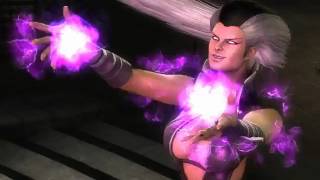
The story presented in last year's Mortal Kombat reboot is easily the most cinematic of any fighting game story to date. Structured as a linear narrative divided into chapters based on the character under the player's control, it takes the existing mythos of the first three Mortal Kombats and essentially serves as a second draft of the original narrative. Existing story arcs are given more depth, characters are given more definition, or in some rare cases, are rewritten almost entirely, and the narrative as a whole works to undo what had become a garbled mess by negating the possibility of major story events that proved problematic in the latter games in the series.
It is, in essence, a major do-over. One that benefits from fan nostalgia while also recognizing and eliminating aspects that just did not work, or never made sense to begin with. If there's any particular flaw that Mortal Kombat has in its story, its on the side of the gameplay mechanics, as the developers insisted on keeping the frustrating difficulty of the old Mortal Kombat boss fights. I have yet to hear anyone state that they enjoyed the final battle against Shao Kahn. For me, my experience with that battle was one of the few poor points in the game's presentation.
Dead or Alive: Dimensions
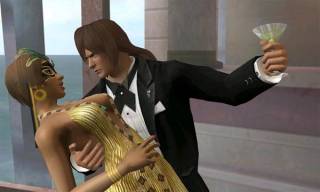
Like Mortal Kombat above, Dead or Alive: Dimensions features a full story mode that compiles and retells the events of the first four Dead or Alive games with a greater level of detail. The end result has both some strong positives as well as strong negatives. While an effort is made to retell the story, rather than reboot it, it's fairly obvious that the narrative arc in Dead or Alive was never particularly strong. The story focuses mostly on the core storyline of the series, and for the most part, the player is in control of a select few characters, with at least lip service given to the more minor subplots of the other characters. But the end result feels disjointed, and for the effort it goes through to present the core story, it still doesn't feel particularly coherent at a number of points.
However, the story mode in this game does succeed in ways where Mortal Kombat lacks. The story mode doubles as a tutorial, and over the course of play is constantly introducing the player to basic and advanced concepts. The final chapter, focused on Helena, pays special attention to the unique aspects of her fighting style and stances. Where Mortal Kombat makes no effort to teach the player how to play as the story progresses, Dead or Alive's story is structured in a way that is ideal for newcomers, both in recapping the plot and in providing a learning experience that exists outside of the more standard and basic training mode.
Soul Calibur V
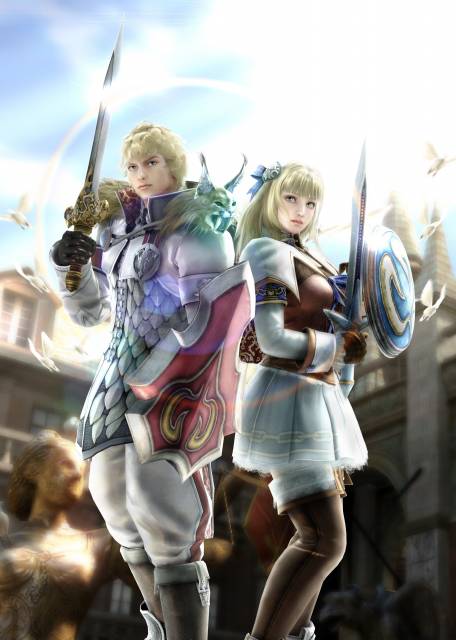
As with both Mortal Kombat and Dead or Alive, Soul Calibur V features a linear storyline with a beginning, middle, and end. But rather than attempt to reboot or retell a preexisting narrative, the story of Soul Calibur V is a true sequel that follows upon the events of the previous game. It is also the shortest of the story modes listed here (it took me roughly two hours to make it from beginning to end in a single sitting), and also the least cinematic; the majority of the plot is told through sequences of static images accompanied by voice-over and sound effects.
All of this being said, the game's story is arguably also the most focused, as it centers on a select few protagonists; Patroklos and Pyrrha Alexandra, the son and daughter of longtime series protagonist Sophitia, and Z.W.E.I., who is playable in a select few chapters. (Before anyone asks, no, I do know why Z.W.E.I. is an acronym, nor do I know what it stands for.) The story takes the basic tale that has driven the series since the days of the original Soul Calibur and tells a new chapter in the struggle between the swords Soul Calibur and Soul Edge that, while still simplistic, offers a greater degree of depth and complexity than the series has really ever been known for. I know that this sounds like a contradiction, but in the comparative sense, by choosing to present the story in the manner that it does and by including specific twists to the narrative, it not only tells a story far deeper than the average, exceedingly shallow fighting game, but also manages to depict the actual relationship between the swords in a light that wasn't as obvious in earlier titles.
That being said, the story isn't without its flaws. Thought the plot does a good job of remaining focused on specific characters, a number of characters that do appear are given very limited roles, and there's one particular twist in the story involving turning back time that could have easily been done without, as it feels like little more than a tacked on way to fit Edge Master into the story. That being said, I enjoyed the story, though this may simply have something to do with the fact that I've been working on a story of my own that features characters very similar in ways to Patroklos and Pyrrha.
In Conclusion
As with any story, mileage will vary, no matter how well a narrative is presented. And while fighting games as a whole have a long way to go to catch up to the narrative quality found in other genres, developers have made great strides during this particular hardware generation in providing a greater sense of complexity and cohesion that the genre had sorely lacked in its early years. And I say this with the understanding that even now, there are many people that could not care less about fighting game narratives; at the end of the day, the greatest draw of a fighting game is how well it plays. But if a fighting game can both feature gameplay that can be taken seriously by the tournament crowd and a storyline that can attract the less competitive mindset, then then all the better.